Komissarzhevskaya Vera Fedorovna is an outstanding Russian actress of the turn of the 19-20 centuries, whose work had a significant impact on the development of theatrical art. Her life was short, but very rich and vibrant. A lot of books, articles and dissertations are devoted to the study of its phenomenon. There is a theater named after Komissarzhevskaya (St. Petersburg), it inspired poets to write poems, a film was made about its fate. She remains a significant part of Russian art even after more than 100 years after leaving.
Parents and early years
Komissarzhevskaya Vera Fedorovna was born on November 8, 1864 in St. Petersburg. Her mother, Maria Nikolaevna, was the daughter of the commander of the Preobrazhensky regiment, and her father was the famous opera singer of the Mariinsky Theater in St. Petersburg. He studied in Italy, then returned to Russia. Vera’s parents married secretly, it was a big story in the city. Over time, the father of Maria Nikolaevna put up with this. The couple had almost three daughters in a row. Faith and sisters grew up in an artistic atmosphere, there were many actors, artists, musicians in the house. Father was friends with M. Mussorgsky. Vera often participated in home performances and concerts. She had a good voice, and her father hoped that she would become a singer. Vera changed several educational institutions, but her enthusiastic character did not allow her to study hard. In the end, her father took her to study at home.
Everything changed when the father of Marya Nikolaevna died, she bought the estate near Vilna and received her eldest daughter Vera to study at the prestigious Institute of Noble Maidens on the inheritance received . The husband remained in St. Petersburg, continued to sing and was not slow to start a new romance. Marya Nikolaevna accepted the blame for the divorce herself and, in order to pay the costs, sold the estate. The rest of her life she led a very poor life. Vera’s mother was sure that the main purpose of the woman was her husband and children. Therefore, when her marriage broke up, she was broken for the rest of her life.
Vocation
Komissarzhevskaya Vera Fedorovna was always closer to her father, they were soul mates with him, but when her parents separated, she stayed with her mother, as her father quickly married again. To support her mother and sisters, Vera needed to get married, and she accepted the offer of Count Vladimir Muravyov. But it was immediately clear that the marriage was unsuccessful. Muravyov loved to drink, he could raise his hand on his wife in a heated state. And then he completely started an affair with Vera's younger sister - Nadezhda. Such a double betrayal stunned the future actress. She, like her mother, took the blame for the divorce on herself and even landed in a psychiatric hospital. It was this suffering that led to the fact that the talent of a dramatic actress was revealed with great power in her. Doctors urged her to find some work to distract her thoughts. And she began to take acting lessons from an actor from Alexandrinka Vladimir Davydov. He discerned a great talent in her and advised him to enter the theater school. But life had its own way.
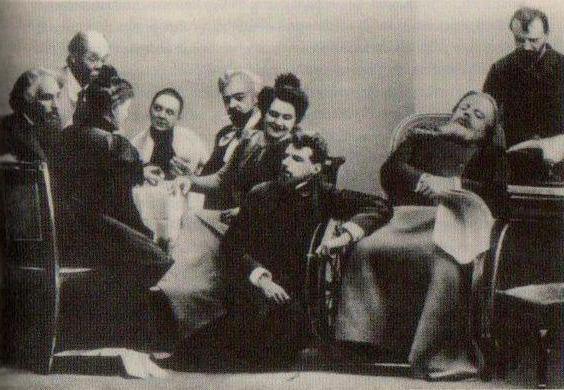
The beginning of the way
In 1890, Vera's father broke up with his second wife and his daughters moved to live with him. Vera has a lot to do with the guitar and helps her father and students. Once a student by the name of Stanislavsky asked her to help him in a play in the Hunter's House, where the actress fell ill. So Komissarzhevskaya Vera Fedorovna first set foot on a real theater stage. At this time, doctors found her a chronic throat disease, this was the last impetus to her decision to become an actress. She plays the role of Betsy in the play "The fruits of enlightenment" in the "Society of Art and Literature" at the school in which F.P. Komissarzhevsky. The season of work in this theater under the leadership of Stanislavsky became a good school and a test for the aspiring actress. Soon, "Society" ceased to stage performances due to material difficulties. But Komissarzhevskaya has already found her path. She was noticed at the performance by P. Kiselevsky - an actor, a friend of his father. He invited her to play roles in Kuskovo in two performances, she brilliantly coped with the assignment.
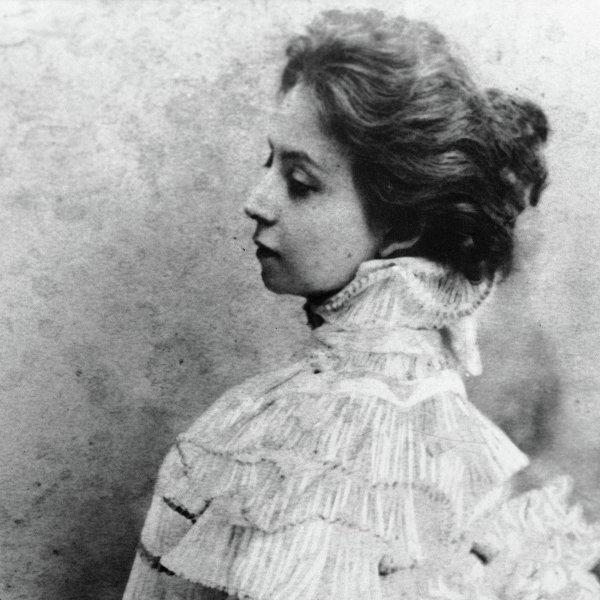
Novocherkassk
In 1893, Vera signed her first artistic contract to work in the entreprise of N. Sinelnikov in Novocherkassk. Helping Vera Kiselevsky highly, but narrowly assessed the ability of the actress. He believed that her destiny was comedy. In addition, he did not build big plans on her account, since he hoped that she would only replace the sick actress for a while. Work in the entreprise was hellishly difficult. In the first five months, she had to play 58 roles. This despite the fact that she had no experience, and each role required elaboration and reflection. And Komissarzhevskaya still managed to learn from her colleagues, kept a diary of observations of their game, sorted out the performances. Sometimes she had to play two performances a day, for the night it was necessary to master the role. During the day, rehearsals were going on; in the evening, playing on stage. Such stream work did not give freedom for creativity and the search for his own method, but gave the skill to play on stage, helped to accumulate experience. Roles at this time she got the most insignificant, empty vaudeville, which were put on the stage and did not imply the depth of dramatic experiences. But Vera took them seriously, regarding each as an important lesson. She herself had to be her dresser, make-up artist and even director. But the work did not go unnoticed, and criticism begins to celebrate her play, first in a few words, then in whole paragraphs. Her authority grew with skill.
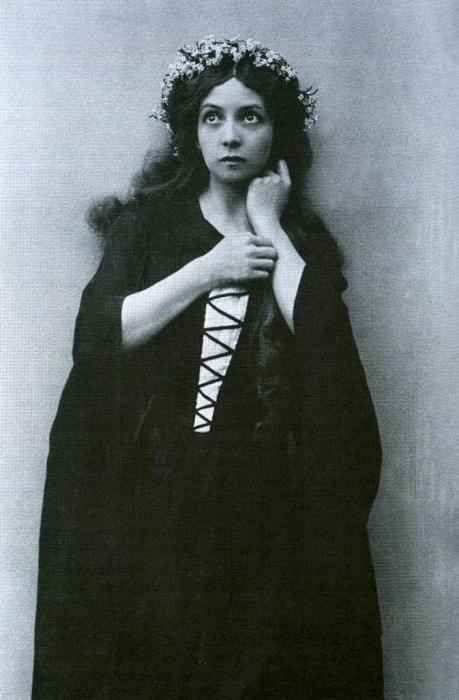
For a year Komissarzhevskaya was able to figure out a little of herself, developed techniques and began to think about more. She began her career too late, at 29, and begins to rush to realize herself. At this time, she reads a lot of serious dramaturgy and dreams of real creativity. Entreprise greatly depended on the tastes of the public, and they were very unpretentious, the Cossacks did not want serious thought from the theater, but only amusement. But Sinelnikov’s theater, which at that time was the best among similar ones, still sometimes decided on serious productions, for example, “Woe from Wit” and “Fruits of Enlightenment”.
For a year of work, the actress was able to show herself, but this did not add to her colleagues' love. Communicating with her was not easy, as she was very demanding on herself and others. The season ended, but Komissarzhevskaya did not receive the expected proposal to extend the contract. Ailing Medvedev returned to the troupe, Kiselevsky saw that Vera did not want to be content with roles in vaudeville and had lost interest in her, her stage colleagues envied her and did not understand her. All this led to the fact that Komissarzhevskaya had to leave Sinelnikov’s entreprise.
Tour
All actresses of the Russian Empire of that time to maintain their financial situation collaborated with enterprises. There were few stationary theaters, mainly in large cities. Therefore, there were quite a lot of touring troupes. Having left Novocherkassk, Vera Komissarzhevskaya at the invitation of the Tiflis Artistic Society goes on tour with them. Here she managed to play 12 roles, including the comedies "Tornado", "Cash Aces" and others. Criticism and the audience well accept the actress, even her father highly appreciates her play. Despite the success, Vera herself was not completely satisfied with herself; she continues to dream of a more serious repertoire. Such self-doubt prevented Komissarzhevskaya from finding a good engagement. After a tour in Tiflis, she returns to Moscow in the hope of finding a job, but she is afraid to go to the agency and sadly sees how troupes fill up and leave, and she remains without work. Suddenly, a colleague in Tiflis invites her to take part in tours in the Lakes and Oranienbaum. This enterprise was distinguished by a more serious repertoire, which Vera really liked. Here she manages to play 14 new roles in 3 months in such plays as “Cunning and Love” by F. Schiller, “Vasilisa Melentyev” A.N. Ostrovsky, "Steppe hero" I.A. Salova.
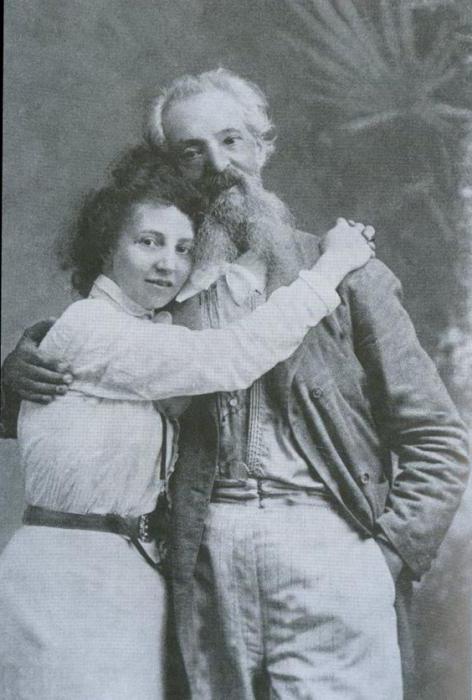
Her success was very noticeable, which confirmed the invitation to work in the Alexandrinsky Theater. But she, again frightened of her inexperience, decided to accept the invitation from the entreprise of Nezlobin in Vilna. The audience and repertoire of this troupe were much more serious than all the previous ones in which Komissarzhevskaya worked. Here in 2 years she played 60 roles, among which there were already undoubted successes: Larisa in A. Bespridannitsa. Ostrovsky, Sophia in “Woe from Wit” by A. Griboedov, Louise in “Shrewdness and Love” by Schiller. Here, her game is appreciated by Nemirovich-Danchenko, Kachalov, Brushtein. For Nezlobin, Komissarzhevskaya fully developed and demonstrated her dramatic talent, which had previously been refused by some critics and her innovation. But she badly lacks a good director who could manage her game.
Alexandrinsky Theater
In 1896, she herself was already beginning to bother about entering the Alexandrinsky Theater. She really did not like the role of the supplicant, she had to worry and reflect on the play for her debut. All this for the 32-year-old actress was already not easy. But she successfully played the debut play Butterfly Fight and was highly praised by critics. The actress brought a new manner to the stage of the theater, built on an inner experience. For six years, Komissarzhevskaya played the best roles in Aleksandrinka, which made her a celebrity and the pride of the Russian theater: Larisa in The Bride, Nina Zarechnaya in The Seagull, Desdemona in Othello, Marikka in The Lights of Ivan Night, Margarita in Faust. " The play "The Seagull" was very highly appreciated by Chekhov, who until the end of his days believed that this was the best embodiment of his author’s intention. He corresponded with the actress for a long time, together they discussed the development of psychological Russian theater. The performance "The Seagull" was not accepted by the public and criticism, this failure was a huge blow to the playwright and actress.
In the theater, Vera found an ally - director E.P. Karpov, with whom they were not like-minded, but together made their way to the new stage, together searched for the right paths. Thanks to this collaboration, the actress realized how great the role of the director was in the fate of the actors. In this collaboration, Vera was able to understand her views on art, which led her to search for a new path.
The search for a new theater
The actress passionately dreamed of a new theater, she had once become infected with the idea from Stanislavsky and cherished the dream of her own theater, in which she could be fully realized. The Alexandrinsky Theater imposed too many restrictions on it; it had its own conservative policy. In her letters and diaries the theme of the path, the search for a new theater, constantly arises. Komissarzhevskaya’s acting theater was built on psychologism, and in Alexandrinka they are required of it mainly for external manifestations, without diving into the depths of the character’s soul. She feels that she is wasting time in vain, that her work on the Imperial scene leads her to nowhere. Therefore, in 1902, she decides to leave Alexandrinka. She does not have money for her own theater, and therefore she has to go on a long tour, she travels almost the whole country, works in Yalta, Kiev, Siberia, Kharkov. But the repertoire was weak, the direction is poor. She needed her director, and she found him in the person of V.E. Meyerhold.
Own theater
The Komissarzhevskaya Drama Theater officially appeared in 1904, for it it rents a building. But the lack of money makes her go on tour immediately and for 2 years she travels around the country, making money and playing second-rate performances to the public’s needs. With heroic efforts and the help of like-minded people, an amount of 70 thousand rubles was collected, and Komissarzhevskaya finally begins to create a stationary, repertoire theater in St. Petersburg. Her goal was a new artistic ideology, the "theater of the soul", for this she needed a special repertoire and troupe. Komissarzhevskaya reads a huge number of modern plays, she chooses for her theater Ibsen, Chekhov, Gorky. The theater has a troupe of like-minded people who are eager to show the world a new look at theatrical art. In 1906, Meyrehold agreed to work in the theater, he staged 13 performances, among them innovative versions of the plays “Gedda Gabler”, “Balaganchik”, “Human Life”. But the relationship between the actress and the director is very difficult, which, together with the failures of the performances, leads to a break. The drama theater of Komissarzhevskaya is ambiguously received by the audience, real scandals happen here. But this was a natural result of the revolutionary actions of the troupe. Working in his theater, Vera had to face misunderstanding, betrayals, failures, but also a tremendous success.
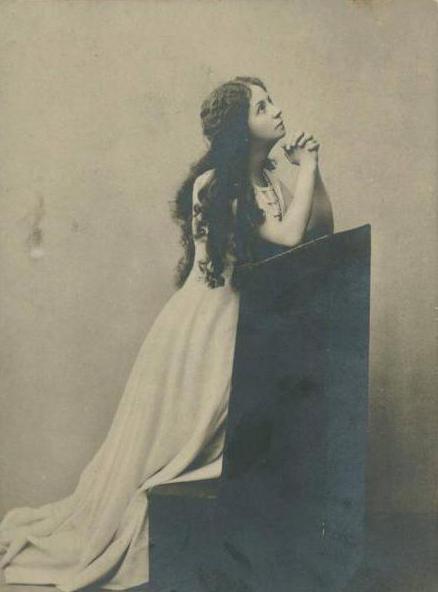
Best Roles
Komissarzhevskaya Vera Fedorovna, whose roles are still examples of the psychological school, during her heyday played a lot of brilliant, innovative characters. Her manner of playing was exclusively suitable for the embodiment of Chekhov’s heroines. So, her Sonia from "Uncle Vanya", Sasha from "Ivanov" and Nina Zarechnaya from "The Seagull" were delicately sensitive, struggling natures. Komissarzhevskaya understood the author’s intention, felt his artistic intention. And despite the fact that many viewers did not accept this interpretation, the playwright himself considered her interpretation to be the best.
Also among the outstanding roles of Komissarzhevskaya include her Larisa from The Bride of A. Ostrovsky, Natasha Bobrov from The Magic Tale by I. Potapenko, Nora in the Doll House of G. Ibsen, Varvara in Gorky's Summer Residents. In each image, she found her own interpretation, was able to discern the grain of the role and convey the deepest experiences of the character.
Theater Disappointment
In 1908, the Drama Theater, already known as the Komissarzhevskaya Theater (St. Petersburg), made a tour in the United States, where Vera received exclusively laudatory reviews. She is called one of the greatest actresses of the 20th century. But Komissarzhevskaya herself is bitterly disappointed with her theater. Working with the symbolist Meyerhold killed a spark in the actress, she did not feel her talent in demand. Vera sees that what was conceived is almost never realized in performances, that actors and directors do not understand each other, and incorrectly interpret the expressive ideas of the new theater. Each new performance by Komissarzhevskaya seems to be a failure. In 1909, she made a very difficult decision to leave the theater.
New hopes
Komissarzhevskaya, an actress of incredible talent who dreamed of a wonderful, psychological theater, realized that nothing could be done with actors brought up in the old traditions. And the thought comes to her to open a theater school in order to educate the actors of the new formation. She planned to recall the lessons of her father, who was a good theater teacher and the experience of Stanislavsky, who created his own system of artistic play. She wanted to teach herself in order to share her experience gained with such difficulty, and also to invite her distinguished friends, actors and directors, she also wanted to call A. Bely, D. Merezhkovsky, V. Ivanov to teach subjects that broaden their horizons. Inspired by new ideas and hopes, Komissarzhevskaya goes on the last tour of her life in Siberia.
Private life
Vera Komissarzhevskaya, whose biography is so short and so full of theater, did not dare to marry a second time. Too big a blow was dealt to her by her first husband, Vladimir Muravyov. But in 1887, during treatment in Lipetsk, she met with Sergey Ziloti, an officer, a highly educated person, a lover of literature and theater. A very warm relationship develops between them, Sergei even brings Vera to the estate to his parents and presents as a bride. In this Komissarzhevskaya house it was always very warm and comfortable. She had been friends with the whole Ziloti family all her life, and often visited them in Znamenka. But she did not marry Sergey.
Komissarzhevskaya Vera Fedorovna, whose personal life was dramatic, gave a lot of time and energy to the feelings on the stage, and that was enough for her. Contemporaries said that A. Chekhov was in love with her, but did not dare to admit it to her. Although, it is possible that he was in love with her talent as an actress, and not with a woman. She had several novels: with the director E.P. Karpov, with a young actor N.P. Roshchin-Insarov, with a diplomat S.S. Tatishchev, with the poet V. Bryusov, but not one of them turned into marriage, since the theater always remained the main thing in her life.
Care
Tours in Siberia and the Far East greatly tired Komissarzhevskaya, she complained to the doctor about pain in the ears. These feelings did not let her sleep, she felt worse every day. The doctor invited to her offered her the only method of treatment - craniotomy. The ailment did not go away, and when several actors of the troupe had already contracted smallpox in Tashkent, Vera Fedorovna’s condition also worsened, it turned out that she also had smallpox. Her pains were unbearable; on January 27th she lost consciousness. Ulcers covered her whole body, pain only intensified. In mid-February, the actress dreamed of A.P. Chekhov, she regarded it as a good sign. But after a few days the condition worsened significantly, on February 23, paralysis of the heart came and the great Komissarzhevskaya died. According to her will, in the first hour after her death, letters and diaries from her casket were destroyed. She ordered to bury herself with her face closed so that people would not see how the disease disfigured her. Komissarzhevskaya Vera Fedorovna (1864-1910) was buried at the Tikhvin cemetery in St. Petersburg.
Memory
The departure of the greatest actress was a real shock for Russia, only after the loss did they suddenly realize the incredible value of her artistic method and the size of her talent. The memory of Komissarzhevskaya is still preserved by his native country. Komissarzhevskaya Theater (Novocherkassk) proudly recalls the times when this actress shone here. Just like a theater in Ussuriysk. Her life’s business is the Komissarzhevskaya Drama Theater in St. Petersburg. He is known all over the world. Komissarzhevskaya street is in Tyumen, Donetsk and Voronezh. Her image is captured in many poems by A. Blok and V. Bryusov. Her talent inspired the creation of music, as A. Kneifel wrote the composition for string instruments Vera, P. Gapon wrote the waltz of her memory, Dangling Strings. Her life and work is dedicated to the wonderful feature film "I Am an Actress" by Viktor Sokolov. The role of Vera was excellently performed by actress Natalya Saiko. The director did not want to shoot a chronological picture, he chose an innovative method - he created a film from separate episodes that are not interconnected, which reveal different facets of the actress’s deep nature. The film shows the tragedy of life, in which the price of talent is peace and personal happiness.